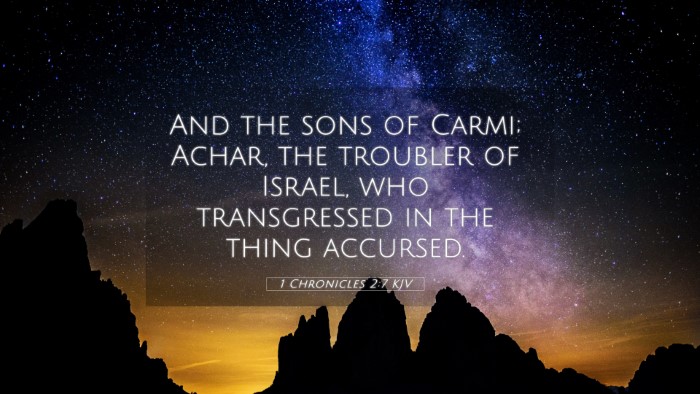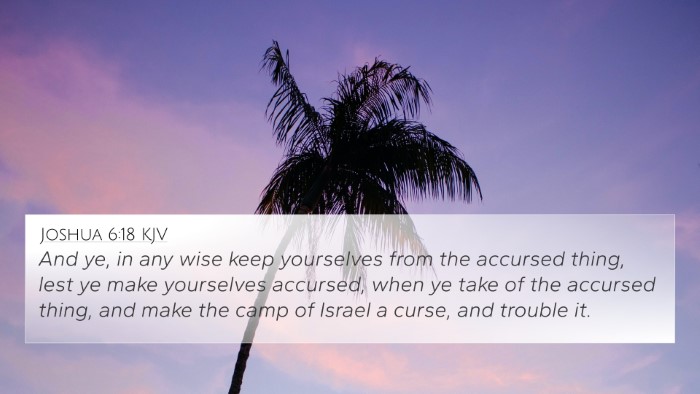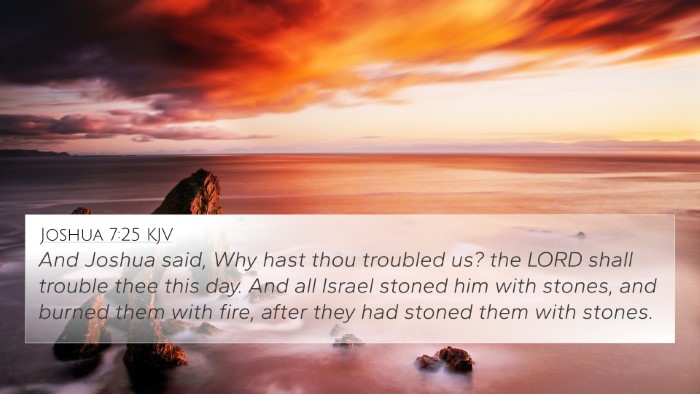Bible Verse Meaning: 1 Chronicles 2:7
Verse: "And the sons of Carmi; Achar, the troubler of Israel, who transgressed in the thing accursed." (1 Chronicles 2:7)
Overview of the Verse
This verse mentions Achar, identified as "the troubler of Israel," highlighting his role in transgressing against God's command regarding the accursed things taken from Jericho. The mention of Achar serves as a pivotal lesson about obedience and the consequences of sin within the nation of Israel.
Commentary Insights
-
Matthew Henry:
Henry emphasizes the significance of Achar's sin, explaining that it was not merely a personal failure, but a sin that brought trouble and repercussions upon the entire nation. Achar's actions illustrate the communal nature of sin and its effects on God's people.
-
Albert Barnes:
Barnes provides insight into the historical context, noting how Achar's sin led to Israel's defeat in battle against Ai. He stresses the importance of obedience to God's commands and the consequences of failing to heed His words, linking Achar's story to the broader narrative of Israel's struggles in maintaining faithfulness.
-
Adam Clarke:
Clarke highlights the literal meaning of the term "troubler," connecting it to the idea of causing difficulty or hardship. He draws parallels to other biblical instances where sin brought calamity, showcasing that each sin, no matter how small it may seem, can have monumental effects on God’s covenant people.
Thematic Connections and Cross-References
This verse can be cross-referenced with several other passages in the Bible that offer deeper insights into the theme of sin and its consequences:
- Joshua 7:1: Explains the background of Achar's sin and its immediate effects on Israel's military endeavors.
- Joshua 7:11-12: Discusses how Israel's sin led to their defeat, showing the ripple effects of Achar's transgression.
- Romans 6:23: Provides a New Testament reflection on the consequences of sin, emphasizing death as a spiritual result.
- Galatians 6:7: Talks about reaping what one sows, aligning with Achar's story of disobedience leading to dire outcomes.
- 1 Corinthians 10:13: Assures believers that they can withstand temptation, contrasting Achar’s failure to resist.
- Proverbs 14:34: "Righteousness exalts a nation, but sin is a reproach to any people." This theme resonates deeply with Achar's actions.
- Hebrews 10:31: Warns about the consequences of falling into the hands of the living God after knowing the truth, paralleling Achar's awareness of God’s commands.
Lessons and Applications
The account of Achar serves as a warning against the dangers of disobedience. It reminds believers of the importance of community accountability in spiritual matters. The following applications can be drawn from this passage:
- Individual Responsibility: Each believer's actions can impact the community of faith.
- Obedience to God's Commands: The seriousness of adhering to God's instructions should not be overlooked.
- Awareness of Consequences: Understanding that personal sin can have far-reaching implications.
Conclusion
1 Chronicles 2:7, through the narrative of Achar, presents a sobering reminder of the perilous nature of sin in the context of community and covenant. It emphasizes the necessity for vigilance and faithful adherence to God's word to avoid the dire consequences of disobedience.
Further Study
For deeper insights into the connections between this verse and others in the Bible, consider exploring the following tools and themes:
- Bible Concordance: A valuable tool for identifying related verses.
- Cross-reference Bible Study: Systematically examining related passages enhances understanding.
- Bible chain references: Tracing themes across verses provides a comprehensive view of biblical teachings.
- Identifying connections: Between the Old and New Testament can reveal deeper theological truths.
In summary, understanding 1 Chronicles 2:7 within the broader biblical narrative enhances our appreciation of God's word and encourages us to reflect on our role within the community of believers.










